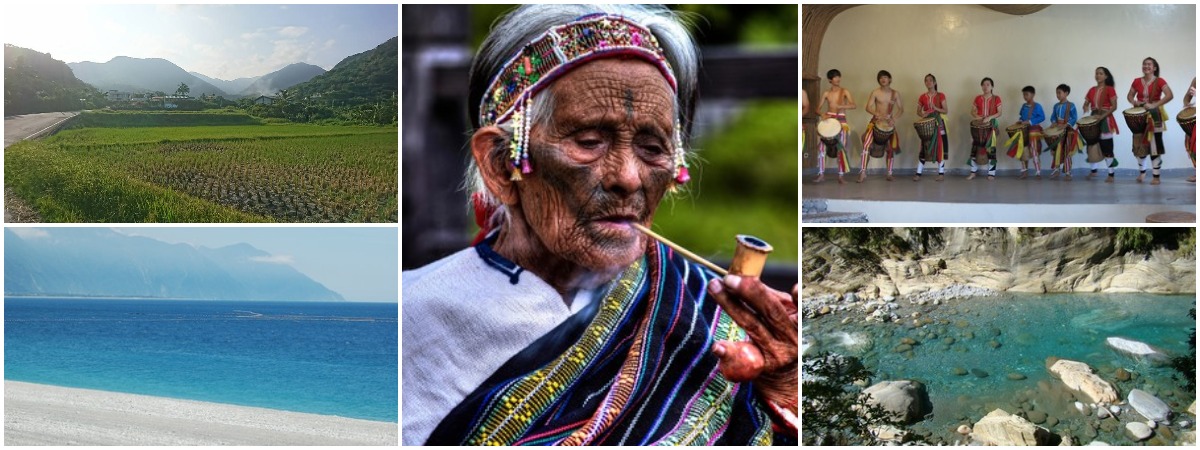
7D/6N: Southern and Eastern Coast
This tour is all about discover local and off the beaten path, in some cases located in remote area. It's not a tour for everybody; therefore please read carefully:
► Some of the accommodations are local, simple and basic B&B. If you are expecting hotels with facilities, this tour is not for you. There are not many hotels located in indigenous and rural areas. In these areas, accommodation will mostly be in family-run guesthouses. In other areas, we can provide also 4* and 5* hotels on request (Taroko, Alishan, Sun Moon Lake).
► These tours are not synonyms of "cheap"; the price we are proposing involves many efforts to be made in advance, during and after your trip.
►You will need to bring along enough New Taiwan Dollar (NT$) in cash, as credit cards are rarely accepted and there are very few ATMs or banks.
► Basic medical care and first aid is usually available but there is rarely a pharmacy. So, bring along an ample supply of all necessary prescription and over-the-counter medication.
► Familiar food can be difficult to find and very local food can be sometimes served, please be ready to accept different/unknown flavors and if you need to refuse, be polite while doing it.
► Taking photos is not a problem in most of the cases, but respect their privacy.
► Taiwan's indigenous tribes have had contact with the outside world and mainstream society for a long time. Even in their villages, they mostly live in modern houses and dress in modern clothing.
Information about the tribes visited on this tour:
Amis tribe
With a population of more than 140,000, the Amis is by far the largest of Taiwan's officially recognized indigenous tribes. The mountains and coast of Hualien to Taitung are where this tribe is concentrated. Traditionally, the Amis possessed a matrilineal society. Women inherited the family property and children were named according to their mother's name. Although women were responsible for the major decisions in their individual households, the political decisions of the village were made by men, with division of labor based on a strict age organization. The Harvest Festival is held in July and August to celebrate the harvest of millet, a traditional staple grain.
Atayal tribe
The Atayal has the largest distribution among Taiwan’s indigenous tribes, stretching from the north to the center and east. This tribe traditionally practiced facial tattooing, which symbolized entry into adulthood and eligibility for marriage. The Atayal believed that after death a person crosses a rainbow bridge to join the ancestral spirits. These tattoos allowed the Atayal to be recognized as members of the tribe and to secure passage over this bridge.
Paiwan tribe
The Paiwan tribe is concentrated in Pingtung and Taitung counties. This tribe traditionally possessed a strict social hierarchy of chieftain, nobility and commoners. The chieftains are responsible for preserving traditions and ceremonies and overseeing the welfare of the village residents. They are the landowners and it is the commoners who work their land, providing a portion of the crops to the chieftains for the use of the land. The Paiwan tribe is well known for the high quality of its art works and handicrafts including pottery making, wood carving and bead making.
Sediq tribe
The distribution of the Sediq tribe is in Nantou and Hualien counties. Similar to the Atayal tribe, the Sediq once practiced facial tattooing. A woman was able to receive facial tattoos if she proved herself a skilled weaver, i.e. able to clothe her family. A man was able to receive facial tattoos if he proved himself a capable warrior, i.e. able to defend his family and village. Textiles were traditionally made using ramie, a type of Asian hemp, and woven on a horizontal backstrap loom. This was hard work, especially as many of the traditional patterns were quite complicated such as rhombuses within rhombuses which represent “the eyes of the ancestors”.
Truku tribe
This tribe originally inhabited Nantou County, but as its population grew it moved into what is today Taroko National Park in Hualien County. The highway that cuts through Taroko Gorge was expanded from a Truku tribe hunting trail. However, in the early 20th century, the Truku tribe was forced to move out of this gorge by the occupying Japanese forces. This tribe is still concentrated in villages surrounding Taroko National Park. As with the Atayal and Sediq tribes, the Truku tribe practiced facial tattooing.
Itinerary
注意事項 Notes
Optional for this tour: the Aboriginal Cooking Class in Hualien: Get to know special knowledge about the local, aboriginal culture, cook like an aborignal and afterwards enjoy your self prepared dishes!
This trip is proposed as an example and can be modified upon client's expectations and requests.
To receive a quotation please send us the following information:
1) Date:
2) How many persons (adults, kids and infants):
Interested in this tour or need more information?
Email:
✉ anna@northwest.com.tw
✉ taiwan.tour@northwest.com.tw
We will contact you within 48 hours (Monday to Friday).
This tour is made in collaboration with Tribe Asia.
About Tribe Asia:
Tribe-Asia, working in partnership with responsible tour operators and indigenous villages and communities, is also developing exciting travel itineraries into Taiwan’s indigenous communities. These tours focus on the ecology and culture of these areas. It is also beginning to expand travel itinerary themes to bring attention to Taiwan's incredible diversity and hospitality.
Discover more on https://tribe-asia.com
Texts and pictures belong to Tribe Asia.
About Northwest:
Founded in 1986, Northwest is one of the major travel agencies in Taiwan. With its 30 years of experience and 2 offices in Taiwan, Northwest offers a professional and multilingual service to satisfy all the needs of our clients.Our network of specialists guarantee you to enjoy the incredible sense of hospitality that the island of Taiwan has to offer with a broad range of budgets.







